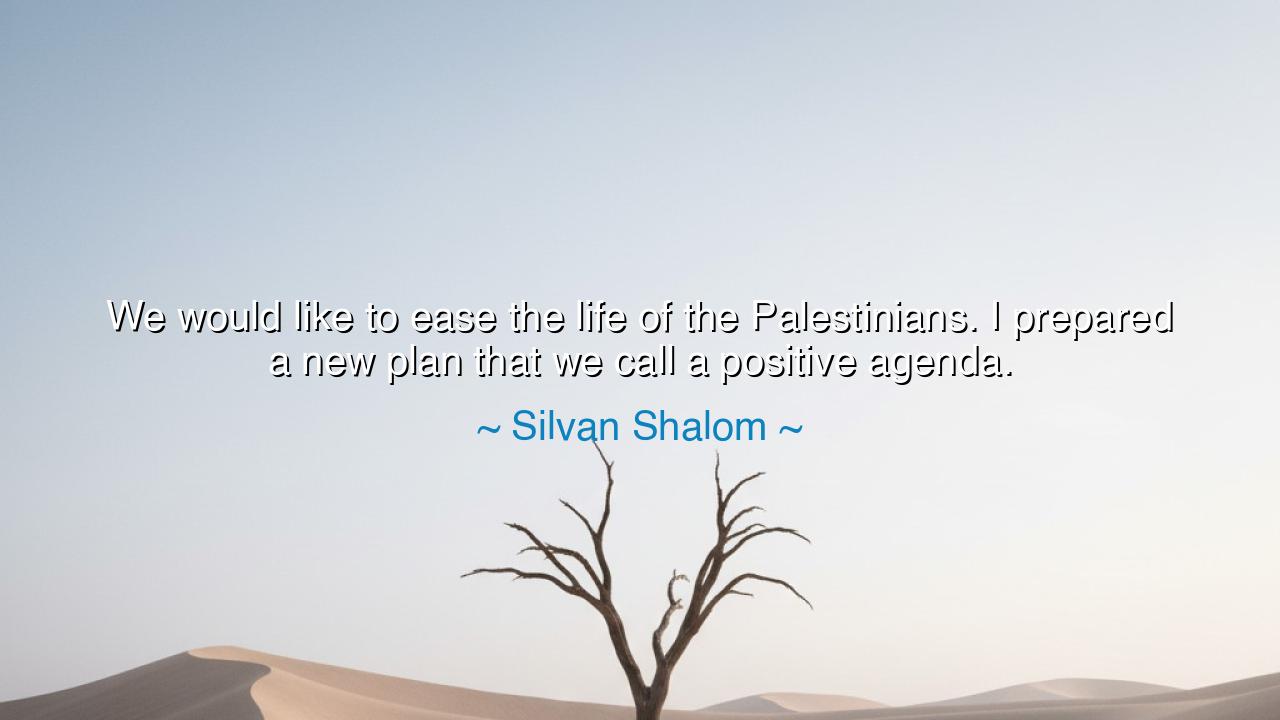
We would like to ease the life of the Palestinians. I prepared a
We would like to ease the life of the Palestinians. I prepared a new plan that we call a positive agenda.






The words of Silvan Shalom — “We would like to ease the life of the Palestinians. I prepared a new plan that we call a positive agenda.” — emerge from the crucible of conflict, where generations have known hardship and the dust of endless struggle. To speak of easing life is to confess that life has been burdened, pressed under the weight of politics, war, and division. Yet in the utterance of a positive agenda, there is also a spark of hope — that even amid bitterness, men may still seek the path of healing.
This declaration comes from the tangled history of the Holy Land, where every stone bears memory of conquest, exile, and prayer. The Palestinians, long enduring the trials of displacement, checkpoints, and uncertainty, have walked through shadows that few outside their world can truly fathom. To ease their life is not merely to offer material aid, but to acknowledge their humanity, to declare before the nations that even in conflict, compassion must remain.
The ancients understood that peace is not born in the clamor of battle, but in the quiet work of building trust. Recall the story of Cyrus the Great, who, upon conquering Babylon, did not enslave its people but freed the exiles, even allowing the Jews to return to Jerusalem. His strength was not only in the sword, but in the vision of justice that turned enemies into allies. So too, the promise of a positive agenda lies in this truth: that power without mercy breeds rebellion, but power tempered with kindness plants the seeds of peace.
Yet let us not be deceived — such words are easy to speak, but difficult to enact. The road to peace is strewn with broken promises, mistrust, and the cries of the grieving. Still, the very act of declaring a positive agenda is itself a recognition that the cycle of pain cannot continue forever. It is a call to choose creation over destruction, to seek the welfare of the neighbor rather than their ruin.
Let future generations learn: the noblest leaders are those who ease the burdens of the afflicted. To wage war is common; to wage peace is divine. If a man can look upon the suffering of his enemy and still say, “I will lighten your load,” then he has transcended the ordinary path of rulers. Thus Shalom’s words, though spoken in a time of strife, carry the timeless wisdom of the ancients — that true greatness is not in conquest, but in compassion, not in dominion, but in the pursuit of a shared and positive future.






Nnpsanh20
It’s encouraging to hear talk of easing the life of Palestinians, but the real question is: how much of this ‘positive agenda’ is actually about meaningful change? What steps will be taken to address the roots of their suffering, including displacement, violence, and limited access to resources? Is this plan a genuine path to peace, or just another short-term solution that doesn’t address the deeper political issues?
AMAnh Mai
A ‘positive agenda’ sounds like a step forward in improving conditions for Palestinians, but how will we measure its success? Will this plan provide real and tangible benefits for the Palestinian people, or will it be more symbolic? Can we truly ease the life of a people living under occupation, or is the idea of easing their life just a distraction from the real challenges they face, such as sovereignty and equality?
PLPham Linh
Silvan Shalom’s statement seems to imply a new approach to helping Palestinians, but how much of this plan is shaped by external political interests? Will the Palestinians themselves have a role in shaping this agenda, or is it being imposed upon them? Is it enough to ease their lives, or do we need a more comprehensive solution that addresses deeper issues of autonomy, rights, and freedom?
NKngoc khanh
The idea of a ‘positive agenda’ for Palestinians sounds promising, but what exactly does it entail? What steps are included in this new plan, and how will it be implemented on the ground? Could this be a real opportunity for dialogue and improvement, or is it another way of controlling or managing the Palestinian population without truly addressing their underlying needs and rights?
HGHuong Giang
Silvan Shalom’s statement about easing the life of Palestinians and his ‘positive agenda’ raises several important questions. Is this plan truly for the benefit of the Palestinian people, or is it a strategic political move? How can we assess whether a plan like this is genuinely focused on improving lives or whether it’s more about shifting perceptions? What is the impact of such plans on long-term peace efforts in the region?